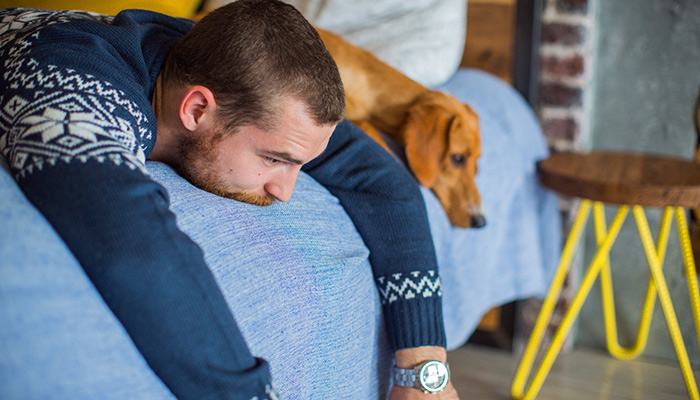Cabin fever, or going stir crazy as it is sometimes called, can occur when people are confined, usually to small areas. Most accounts of people experiencing cabin fever relate to being stuck inside during extreme winter weather. Today’s situation, where health-related circumstances are causing thousands of people to be confined for quarantine reasons, is rare, but has occurred in response to major illness outbreaks before.

Symptoms of cabin fever can vary. Some people will feel stress, worry or extreme anxiety. They may experience low mood or depression, or it could manifest as irritability or frustration.
Ultimately, cabin fever is caused a combination of things: environmental changes, loss of control and restrictions in access, physicality and being able to get on with your daily routines and commitments. Individually all of those things are problematic and combined they can be especially difficult.
People who have pre-existing mental health problems might be more vulnerable. But it can be hardest felt by active, healthy, outdoorsy individuals, for whom the physical restrictions are a big change to their pre-existing lifestyle.
So why don’t astronauts and submarine pilots, often confined to tiny spaces for weeks on end, experience cabin fever? Obviously, they train for it but also they have self-selected to go into these professions with restrictive environments so they are already a specific kind of character who can deal with this. Plus, they are working, so they are mentally occupied and task-oriented. These other people have been taken away from their regular lifestyles and they are losing the element of control and choice over that decision.
When situations are out of our control it can make us feel very powerless, and for some people, it can feel like there’s not much they can do. But there are ways we can respond to difficult circumstances that can make things better – or worse.

Five key helpful strategies are similar to those we would give for managing symptoms of anxiety and depression.
- Keep a level head and think realistically about the situation. When we feel anxious or depressed, or feel that things are out of our control, our thoughts can spiral and become more extreme or catastrophic. Try to remember that this quarantine situation is a brief time-limited period of isolation, and it will end. Remembering that it is to assist with public safety and not personal can also be helpful.
- Take care of yourself. When people are isolated for long periods of time, they can feel lethargic, down or irritated. They may not be motivated to do things like shower, get out of their pyjamas, or eat well. Making the effort to maintain good hygiene, health and eating habits is important for improving our mood and maintaining our emotional and physical wellbeing.
- Keep active – mentally and physically. They obviously can’t run laps of the cruise ship so they need to think creatively about what they can do in their limited space: push ups or lunges, Pilates or yoga, stretching or running on the spot. They also need to keep mentally active: meditation, games, wordplay, puzzles.
- Social connection with others can be important. Contact with friends and family who are also in quarantine, or via phone or video chat, can help reduce feelings of isolation; watching television can help reduce feelings of disconnection.
- Try to focus on pleasant and enjoyable activities that can be done while they are isolated, or planned for the future. While quarantined, they could listen to music, read, play games, organise their personal affairs and calendar and plan their next holiday.
These instances of cabin fever are unique, but have occurred during previous health crises such as the SARS outbreak in 2003.
The added health and illness focus could feed into feelings of anxiety: not only is there restriction on your activity and control over where you can go, but there is an additional layer of concern about whether you've contracted the illness.
Cabin fever is not a diagnosabe mental health condition. Everyone feels worried, annoyed or sad at times, and someone who has been cooped up studying or working all day can feel the same way - but this will often resolve once they stop and go outside and have a cup of tea in the sun or take a walk around the block. With the quarantined group confined for several weeks, most will return to normal life and feel OK fairly quickly, even if they have been distressed in there. A minority may not be OK. It is difficult to pinpoint who may have residual issues ahead of time, but some may need extra help once they return home, in which case it will be useful for them to seek treatment.
Anyone with a loved one who has been suffering from cabin fever can support by helping them get back into the normal activities. Ask about their experiences - and how they are feeling now. Be there for them.
Researchers and experts – and students! – will likely study this, although the logistics of collecting data will be restrictive at the moment. But we can anticipate more information on cabin fever and the impact of living in confined spaces down the track.
Dr Carly Johnco is a Senior Research Fellow in the Department of Psychology and a registered Clinical Psychologist.
This article was first published on February 21, 2020.



